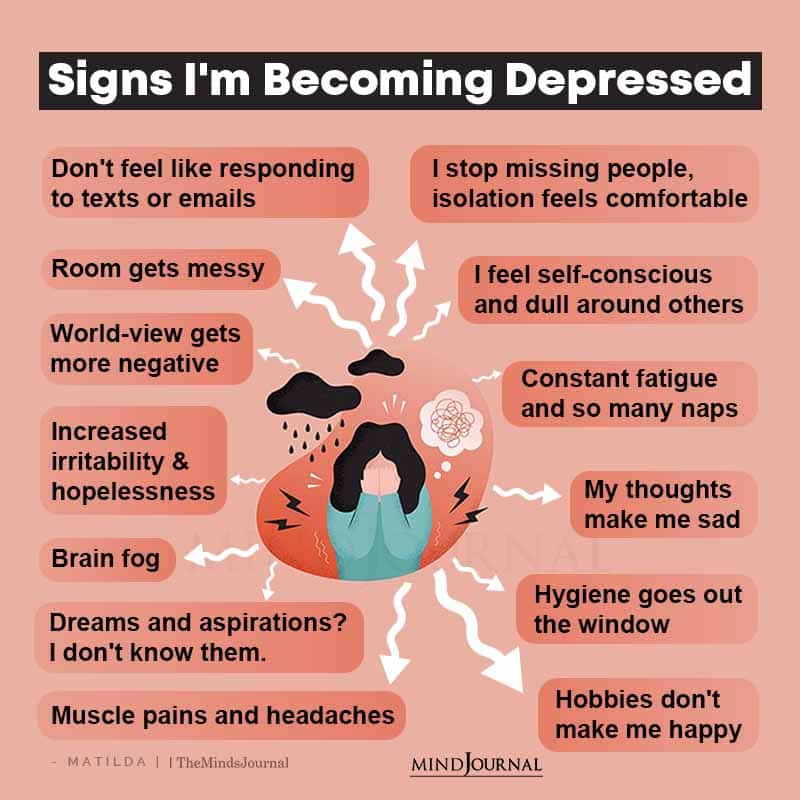Struggling with intrusive negative and depressive thoughts? Not sure what you can do to deal with them. Let’s explore how to overcome negative thinking and depression by delving deep into some crucial steps to help you shift from a mindset dominated by pessimism to one illuminated by hope and positivity.
How to Overcome Negative Thinking and Depression
Is it really possible to change the way you think and feel about yourself and the world around you? Many of us often grapple with this question, especially during moments when the weight of negative thoughts and depression bear down on us.
The good news? The answer is a resounding yes. With the right strategies and techniques, you can learn how to overcome negative thinking and depression, leading to a more balanced, happier, and fulfilling life.
Read 13 Habits Of People With Concealed Depression
Here are a few tips on how to overcome negative thoughts and depression –
1. Understand Your Thoughts
Never underestimate the power of awareness. Recognize patterns by observing your thoughts without judgment. What are the narratives you tell yourself regularly? By identifying these patterns, you’re in a better position to challenge and transform them.
Journaling is an excellent way to deal with this. Simply write down your thoughts. This simple act provides clarity, and you might be surprised to discover some recurring negative beliefs.

2. Challenge Your Negative Beliefs
Ask yourself, “Is this thought based on fact or assumption?” Most negative beliefs aren’t grounded in reality. By identifying and separating facts from fiction, you weaken the power of negative thoughts and depression.
Counter this with positive affirmations. Counter every negative statement with a positive one. As an example, instead of thinking, “I cannot accomplish this,” tell yourself, “I possess the capability to overcome challenges.”
Related: How To Get Better From Depression (Without Medication Or Therapy)
3. Stay Physically Active
Exercise isn’t just good for the body – it’s a powerful tool for the mind. Physical activity releases endorphins, natural mood boosters. A simple walk in the park can significantly reduce symptoms of negative thinking and depression.
4. Establish a Healthy Routine
Routine brings structure, and structure can act as an anchor during tumultuous times. Prioritize 7-9 hours of sleep. Rest is vital in helping our brains process emotions.
Also make sure to eat a balanced diet. Eat foods rich in omega-3 fatty acids, antioxidants, and vitamins. They play a role in regulating mood and combating depression. This is how to overcome negative thoughts and depression.
5. Connect with Others
Engaging in meaningful conversations and spending quality time with friends and family can boost your mood. Knowing you’re not alone in your struggles can be incredibly comforting.
6. Limit Exposure to Negativity
Whether it’s news, social media, or even negative people around you, limit your exposure. Surround yourself with positivity and engage in activities that uplift you.
7. Seek Professional Help
There’s no shame in seeking help. Therapists and counselors are trained to guide individuals on how to overcome negative thinking and depression. Sometimes, speaking to an unbiased party can provide clarity and a fresh perspective.
8. Engage in Activities That Bring Joy
Whether it’s painting, dancing, cooking, or simply reading a book, engage in activities that make you happy. These activities act as a distraction and help break the cycle of negativity.
9. Practice Mindfulness and Meditation
Mindfulness practices, such as meditation, can bring you back to the present moment and reduce rumination. By being present, you can acknowledge your feelings without being overwhelmed by them.
10. Set Realistic Goals for Yourself
Start with small tasks that you can manage, and break them down into smaller steps. As you achieve each step, the sense of accomplishment will work wonders for your confidence and mood.
And make sure to celebrate small wins: Every achievement, no matter how small, is a step in the right direction. Recognize and reward yourself for these accomplishments.
Related: Mood-Boosting Foods: 9 Foods That Fight Fatigue And Depression
11. Limit Caffeine and Sugar
High levels of caffeine or sugar can make you feel jittery or anxious, potentially increasing negative thinking. So mind your intake. Opt for balanced meals with proteins, whole grains, and healthy fats to stabilize your mood.
12. Educate Yourself
Learn about depression. Sometimes, understanding the root cause or the science behind what you’re feeling can demystify and reduce the stigma. Knowledge is power; use it to empower yourself.
13. Cultivate Gratitude
At the end of each day, reflect on three things you’re grateful for. Over time, this simple practice can shift your focus from what’s lacking or negative to the abundance in your life.
14. Avoid Alcohol and Drugs
While it might seem like these substances offer relief, they can often exacerbate feelings of sadness, anxiety, and despair. It’s essential to face your feelings soberly to genuinely process and manage them.
15. Spend Time in Nature
There’s something inherently calming about nature. Whether it’s the sound of the waves, the chirping of birds, or the rustling of leaves, nature has a way of grounding us. Regularly spending time outdoors can help reduce the symptoms of depression and negative thinking.

Remember, the journey to overcome negative thinking and depression is deeply personal. What works wonders for one person might only be mildly effective for another.
It’s crucial to be patient with yourself and understand that healing is not linear. With time, effort, and the right strategies, you can navigate this journey and embrace a more positive, hopeful outlook on life.
Takeaway
Life, with its ebb and flow, will inevitably have its downs. However, by being proactive, and employing these strategies, you’ll equip yourself with the tools necessary to combat negative thoughts and feelings.
Remember, knowing how to overcome negative thinking and depression doesn’t mean never feeling down; it means having the resilience to bounce back and find joy again.
Don’t hesitate to reach out for help if you need it. And above all, always hold onto hope – brighter days are on the horizon.
Related: How To Help Your Friend With Depression
Frequently Asked Questions (FAQs):
How do you get rid of negativity and depression?
Seek support, prioritize self-care, exercise, mindfulness, therapy, limit stress, set boundaries, sleep, gratitude, nature, hobbies, connect, avoid toxins, journal, music, laugh.
How do I stop being a negative thinker?
Awareness, challenge thoughts, gratitude journal, mindfulness, meditation, positive affirmations, surround with positivity, limit exposure, practice acceptance, seek therapy, self-compassion, reframe, breathe.
How can I train my mind to think positive?
Mindfulness, meditation, gratitude journal, affirmations, challenge negativity, set goals, visualize success, read positive literature, surround yourself with optimists, celebrate wins, and be mindful of your self-talk.










Leave a Reply